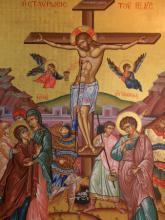
On this day we celebrate the sufferings of Christ: the mockery, the crown of thorns, the scourging, the nails, the thirst, the vinegar and gall, the cry of desolation, and all that the Savior endured on the Cross; also the confession of the Good Thief. At the same time, the Passion is not separated from the Resurrection; even on this day of our Lord's deepest self-abasement, we look forward also the revelation of His eternal glory:
The Cross and Resurrection, as we have seen, are aspects of a single, undivided act of salvation:
Friday Matins are usually 'anticipated' and held on Thursday evening. They take a special form, with a series of twelve Gospel readings that begins with Christ's discourse at the Last Supper and ends with the account of His burial. In the Greek use there comes a 'high point' shortly before the sixth Gospel, when the priest carries a large Cross from the sanctuary and sets it up in the center of the church. This ceremony, which originated in the Church of Antioch, was only adopted at Constantinople as recently as 1824; it is not found in the practice of the Slav Churches. Here we find the principle of dramatic representation carried a stage further than hitherto, through not only the use of words but of visible actions.
On Friday morning, the Hours take a solemn form, as on the eves of Christmas and Theophany, with an Old Testament reading, an Epistle and a Gospel at each Hour. Vespers follow, either immediately after the Hours (normal Greek use) or in the afternoon (Slav use). At the end of Vespers, as was done earlier at Matins in the Greek use, the events of Great Friday are represented not only through words but through dramatic actions. The Epitaphion (Ed. note - "winding sheet") - an oblong piece of stiffend cloth on which is painted or embroidered the figure of the dad Christ laid out for burial - is carried in procession from the sanctuary to the center of the church, and is then venerated by the faithful. There are few more moving moments in the whole of the Church's Year.
In present practice, no Liturgy is celebrated on Great Friday - neither the complete Liturgy (except when it also is the Feast of the Annunciation) nor the Liturgy of the Presanctified.
- From The Lenten Triodion, "The Meaning of the Great Fast", Metropolitan Kallistos (Ware)
